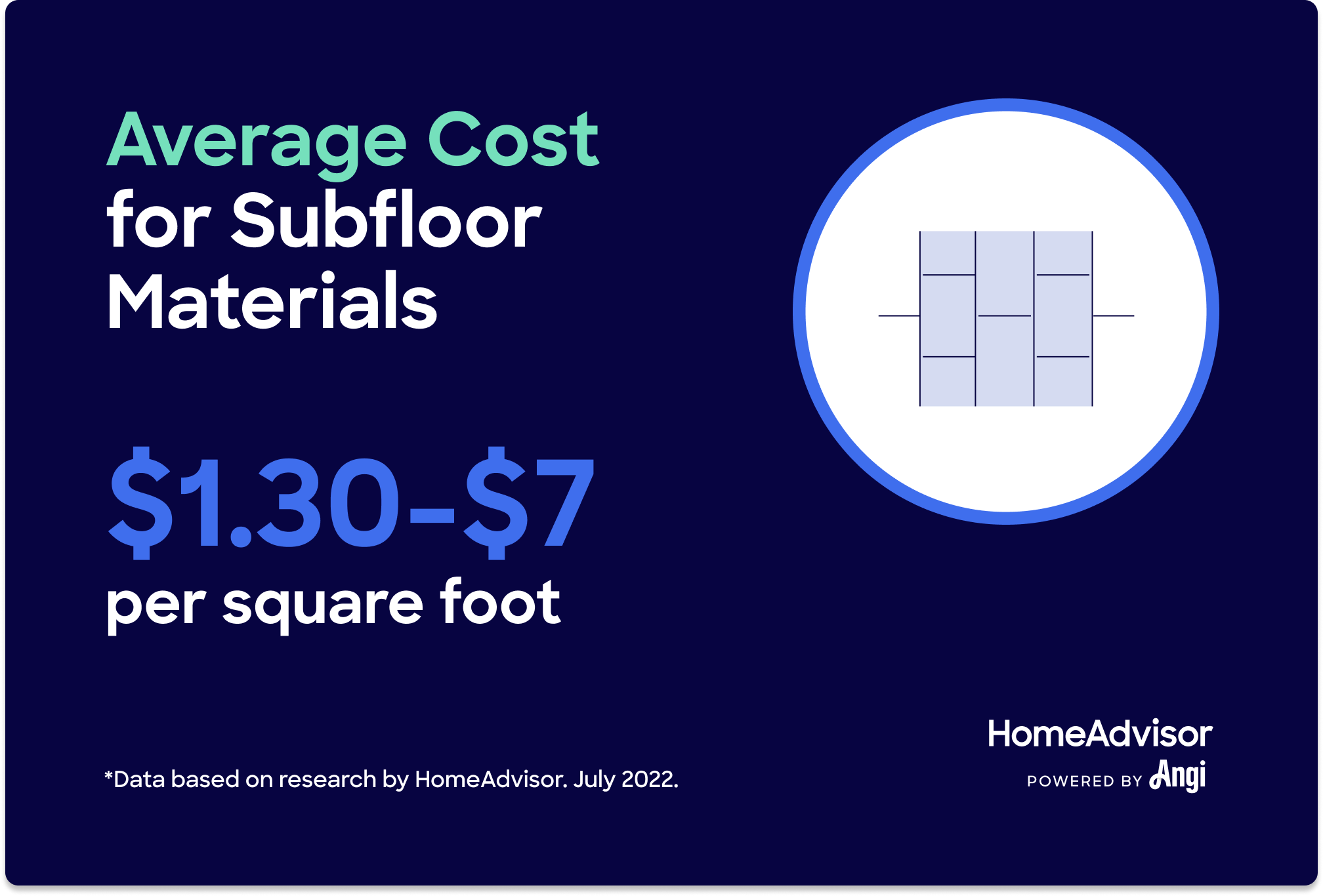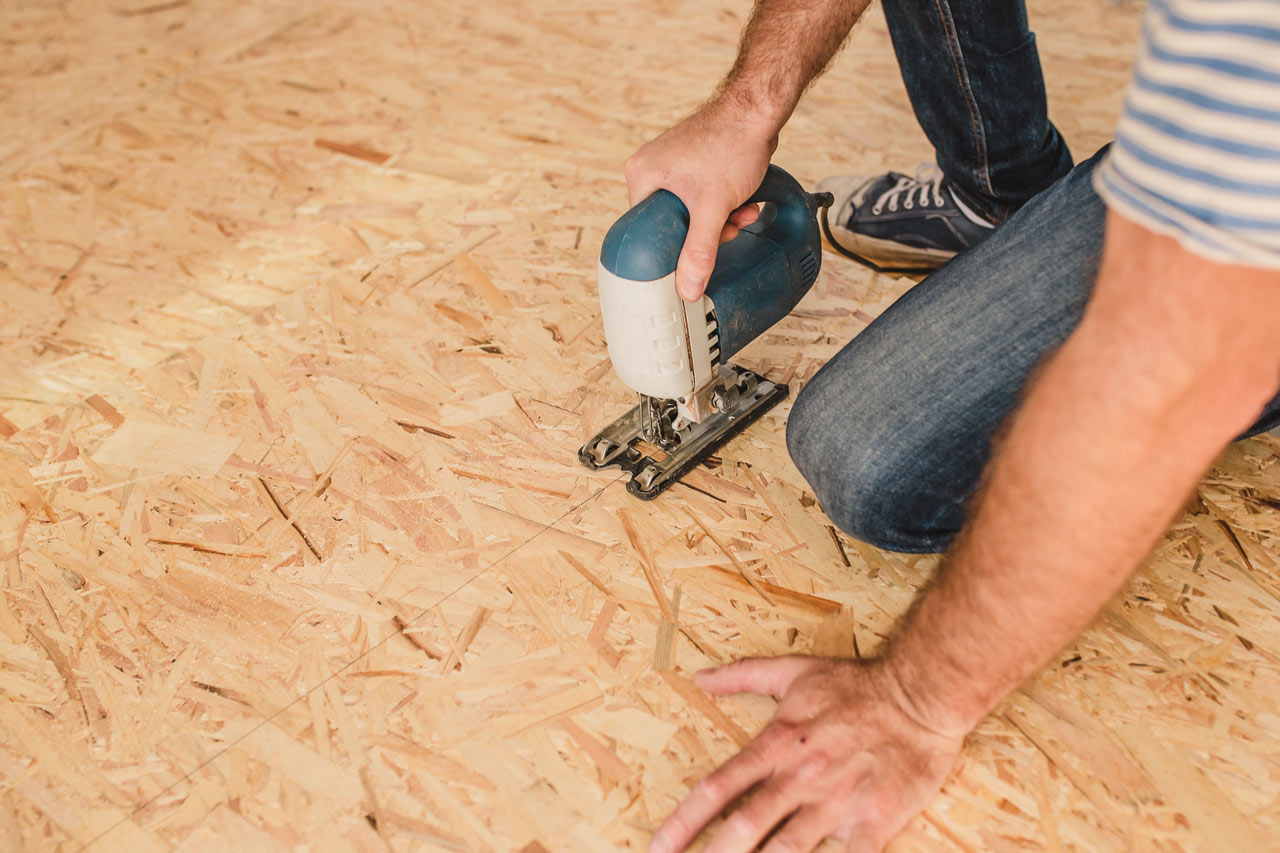How Much Does It Cost to Replace Subflooring?
Typical Range:
$428 - $2,978
Typical Range:
$428 - $2,978
Cost data is based on research by HomeAdvisor.
Updated April 16, 2024
Written by HomeAdvisor.Hiring a pro ensures level floors, proper support for furniture, and correct moisture barrier installation.
Subfloor replacement costs range between $1.30 and $12 per square foot, depending on the material chosen.
The cost of a subfloor project is impacted by room size, choice of subfloor material, labor rates, and any additional replacement costs.
Popular subfloor materials include plywood, treated plywood, DRIcore, Amdry Insulated Subflooring, Barricade, Warmboard, Delta-FL, Advantech, OSB, and concrete slab.
Signs you need to replace your subfloor include squeaky floors, weakened areas, cupping floorboards, a musty odor, and water damage.
Subfloor replacement benefits include improving floor strength, preventing moisture issues, and enhancing comfort underfoot.
Highlights were summarized from this existing cost guide text using automation technology and were thoroughly reviewed for accuracy by HomeAdvisor Editor Ryan Noonan.
The average cost to replace the subflooring in a 306-square-foot room is $594, including plywood subfloor replacement materials and five hours of labor. For a DIY job with low-cost materials, a homeowner might pay as little as $428 for the same room, or as much as $2,981 to hire professionals to install premium subflooring. To replace concrete slab subflooring in the basement of a 1,500-square-foot home, expect to spend at least $9,720.
The size of the room will largely determine the total cost to replace your subflooring. Prices range between $1.30 and $12 per square foot, depending on whether you choose plywood, treated plywood, or another common subfloor material your contractor might recommend.
For context, you might pay $173 for the materials required for a simple DIY subflooring replacement in a 115-square-foot bathroom. To have contractors replace concrete slab flooring to a 1,500-square foot basement, you might pay as much as $18,720, including labor and materials.
The other major factor contributing to the final cost of your subfloor replacement is your choice of materials. Some materials are better suited to different rooms. For example, you’ll need to choose a moisture-resistant flooring in the basement but opt for a more comfortable, forgiving material in the main living spaces.
| Materials | Price per Square Foot |
|---|---|
| Plywood | $1.50 |
| Treated plywood | $2.81 |
| DRIcore | $1.65 |
| Amdry | $3 |
| Barricade | $1.75 – $2.25 |
| Warmboard | $7 |
| Delta-FL | $1.30 |
| Advantech | $4.25 – $9.25 |
| OSB | $1.40 |
| Concrete slab | $6 – $12 |
Plywood costs around $40 to $50 per 4-by-8-foot panel. That equates to around $1.50 per square foot for a 5/8-inch panel. For a 306-square-foot room, that's a total of $459.
Treated plywood panels—either fire retardant or pressure-treated—sell for $90 apiece, for an average cost of $2.81 per square foot.
The most common type of subflooring is made from 3/4-inch thick plywood panels. Most types of plywood subflooring fit together using a simple tongue and groove system, allowing them to lay flat without squeaking underfoot.
On average, DRIcore costs $10 per 2-by-2 foot panel, or around $2.50 per square foot. One of the more popular alternatives to plywood, DRIcore engineered panels are composed of a hard plastic base and a top layer made of oriented strand board (OSB)—thin strips of wood bonded with wax and resin. The product is highly moisture-resistant.
It costs $3 per square foot, or $920 for a 306-square-foot room. You must also purchase connectors to complete the installation. A package of 15 connectors costs about $20.
Designed for concrete slab basements, Amdry’s multilayered panels are highly insulated, offering products with R-values from 5 to 7, the highest among all subfloor materials on the market.
Expect to pay between $7 and $9 per 2-by-2 foot panel or between $1.75 and $2.25 per square foot. Barricade subfloor systems serve various needs, including sound dampening, floor heating, and moisture resistance. The company provides products suited to many flooring materials, including vinyl, laminate, engineered hardwood, carpet, and tile.
Used with radiant heat hydronic systems, Warmboard costs about $7 per square foot or $2,200 for a 306-square-foot room. Adding radiant floor heating costs between $1,750 and $6,000.
Delta FL costs around $250 per roll, or $1.30 per square foot. Installation requires a roll of special waterproof tape, which adds between $10 and $17.
Delta-FL subfloor underlayment acts as a dimpled plastic membrane installed beneath plywood subflooring to regulate moisture. The membrane creates an air pocket, establishing vapor pressure that prevents the room from becoming excessively humid or uncomfortably dry. The flexible material also adds a layer of cushioning, making your floor more comfortable underfoot.
Costs run between $4.25 and $9.25 per square foot. A mid-range engineered wood subflooring system, Advantech panels feature a tongue-and-groove design. Well-suited for DIY installation, the panels are designed to be durable and moisture-resistant.
OSB panels tend to cost about 10 to 20 percent less than plywood, or about $1.40 per square foot for an OSB tongue and groove system. An inexpensive and popular material, oriented strand board (OSB) is an engineered wood similar to particleboard.
OSB subfloor systems come in thick, heavy panels that match the heft of plywood and provide structural support. On its own, OSB is highly absorbent, putting it at risk of warping in case of a flood.
Average concrete slab costs fall between $6 and $12 per square foot. Some homeowners skip wood-based subfloors altogether and install a concrete slab for maximum durability. A flooring contractor can install tile and stone directly on top of concrete slab subflooring, but if you want carpets, hardwood, or laminate, you’ll need to install an underlayment on top of the concrete.
This subflooring does little to stop moisture or cool air from entering your home, so you may need to add a moisture barrier or additional insulation.
Most subflooring systems are sold in four-by-eight-foot panels. To determine replacement costs for the room in question, calculate the room's square footage by multiplying the length by the width in feet. Then, divide the total by 32 (the area of a standard-sized panel) and round up to the nearest foot.
| Room | Average Size | Average Materials Cost (Plywood) |
|---|---|---|
| Bedroom | 224 square feet | $336 |
| Kitchen | 175 – 200 square feet | $263 – $300 |
| Bathroom | 115 – 220 square feet | $173 – $330 |
| Living room | 220 square feet | $330 |
| Basement | 1,500 square feet | $2,250 |
Expect to pay between $2 and $2.75 per square foot for both labor and materials. Since the subfloor job for a mobile home is specialized, it's best to hire a professional to complete the work.
Contractors typically charge between $25 and $30 per hour to remove and replace subflooring. To start, the contractor removes the flooring, cuts the old subfloor into pieces, and then hauls the material to a waste facility.
Once the old subflooring is gone, the contractor will repair or install the new subflooring. Typically, homeowners use the same company to install the new finished floor surface.
A small, simple job can take as little as 4 hours, while a larger project—like fully replacing the subflooring in a finished basement—can take up to 24 hours over four-to-five days. The time required to repair, replace, or install new subflooring varies by several factors, including:
The type of room
The size and shape of the room
The number of appliances and furniture pieces that need moved
Whether you hire the same company to both remove and install the new floors
With most subfloor repairs or replacements, you’ll likely replace the flooring and the floor joists as well.
The average cost of flooring installation is $12.50 per square foot, with homeowners typically paying $4,000 to install new floors in a 320-square-foot bedroom. Cost factors include your choice of material, room size, and labor costs.
Carpet averages $4.50 per square foot, and hardwood averages up to $14 per square foot.
Joists supports your floors, so it’s important to have a local home inspector inspect them when replacing your subflooring. Floor joist replacement costs an average $12,500 altogether, but vary widely depending on the extent of the damage and the type of joist. Expect to pay between $100 and $2,000 per joist.
Signs you might need to replace your joints include:
Visibly moist or rotting wood
Tilted or sinking crawl space supports
Uneven or tilting door and window frames
Sloping or sagging within your upstairs floors
Cracks in interior drywall
The cost to repair or replace plywood subfloors, for example, is $1.50 per square foot for materials plus $25 and $30 per hour for labor.
In some cases, you can repair damaged subflooring at a cost lower than replacement. Your contractor might suggest repairs for issues like water damage, gaps between panels, dry rot, and pet damage.
Water-damaged floor repairs can cost between $200 and $550. For information on how to repair hardwood, laminate, or another top flooring choice, check out our flooring repair cost guide.
Installing subflooring requires a good amount of expertise. While it's possible to do it yourself, hiring an experienced professional will ensure your floors are level and capable of supporting your furniture and appliances. A local flooring contractor will help determine if you need a moisture barrier to prevent future water damage. Get in touch with a qualified professional today.
Ideally, your subfloor should last as long as your house, but you may need to replace it sooner if previous owners used faulty materials, a contractor performed the job poorly, or your flooring is more than 20 to 30 years old.
Symptoms of a decaying subfloor include:
Loudly squeaking floors
Dipping or weak areas in the floor
Cupping floorboards
Cracked tiles
A musty odor
Flooring that feels springy underfoot
A loose toilet in the bathroom
Flooding, or any kind of water damage, is the most common cause of damaged subfloors. If your house has flooded or your crawl space is overly humid, be on the lookout for any weakness in your subfloor.
It depends. If the current subflooring is in good condition, you may be able to apply a new subflooring over top. However, if there are broken or worn parts on the current subflooring or if it’s rotting or decaying, it’s best to remove what’s there and start from the beginning.
Joists are the wooden framing that’s under the subfloor, while an underlayment or a floor covering goes over the subfloor. The underlayment is a thin material that’s there to provide a flat surface for the floor covering, whereas the floor covering is what you see and walk on, like carpet.
Whether you can repair or replace your subflooring really depends on the extent of the damage. Rot or decay on a small portion of the floor—usually indicated by squeaking or sagging floors—are usually repairable. If the damage persists over a significant chunk of your floor, or if the problems are complex, repairs could price out just as much as a replacement. Contractors typically charge between $25 and $45 per hour for subfloor repairs—a slightly higher rate than for removal and installation.

